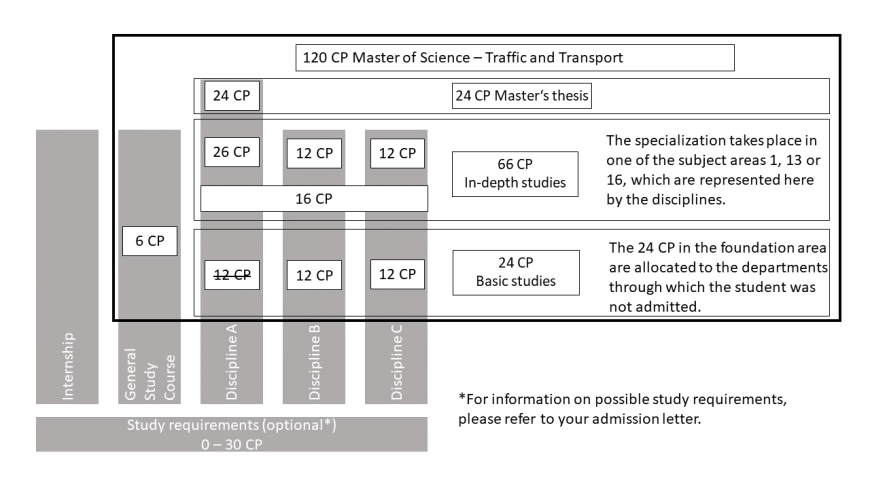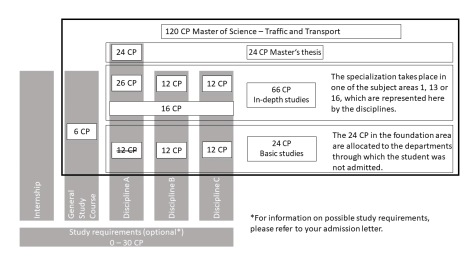The program includes the following disciplines:
- Law and Economics (Department 1)
- Civil and Environmental Engineering (Department 13, lead)
- Mechanical Engineering (Department 16)
Explanation of the structure
The Master's program is divided into modules, which combine different courses (lectures, seminars, exercises, etc.). Modules are generally completed by an oral or written examination after attendance of the associated course(s). The scope is measured in credit points (ECTS). One CP corresponds to approximately 30h of work (usually 10h of lecture time, 15h of self-study and 5h of homework). The courses to be attended, the examinations to be taken and the CP to be earned are determined by the discipline in which the Bachlor's degree was obtained and the student's choice of subjects according to the rules stated below:
At least 90 CP are to be acquired in the basic study area and the in-depth area together.
- First of all, basic knowledge of 12 CP per discipline must be acquired in the disciplines in which the Bachelor's degree listed as the admission qualification has not been acquired. The scope of the compulsory basic knowledge can be reduced or increased by admission.
- Furthermore, in the specialization area, the existing knowledge in each discipline is to be deepened. The in-depth examination subjects are to be selected from a pool of in-depth courses with at least 12 CP per discipline. A minimum of 26 CP must be earned in the discipline in which the Master's thesis will be written.
- The basic area comprises courses with a scope of 0 – 24 CP, the in-depth area of 66 – 90 CP. Modules to the extent of the difference between the total of 90 CP and the compulsory scope of the individual areas can be freely selected from the remaining in-depth courses.
- Students, whose degree leading to admission is not categorized as mechanical engineering, must take at least two of the following modules in the Department of Mechanical Engineering:
- Automobile Technology
- Flight Mechanics I: Aircraft performance
- Fundamentals of rail vehicle technology
- For students whose degree leading to admission is assigned to mechanical engineering, the modules “Automotive Engineering” and “Flight Mechanics I: Flight Performance” may be given as requirements.
- In parallel to the basic and in-depth study area, additional modules of a General Study (6 CP) (from the offer of the TU Darmstadt) are to be selected.
- The Master's thesis has a scope of 24 CP.
- The General Examination Regulations stipulate that at least 30 CP must be completed within the first two semesters.
Further information:
Further regulations regarding the handling of modules, grading, etc. can be found in the General Examination Regulations of the Technische Universität Darmstadt (APB).





